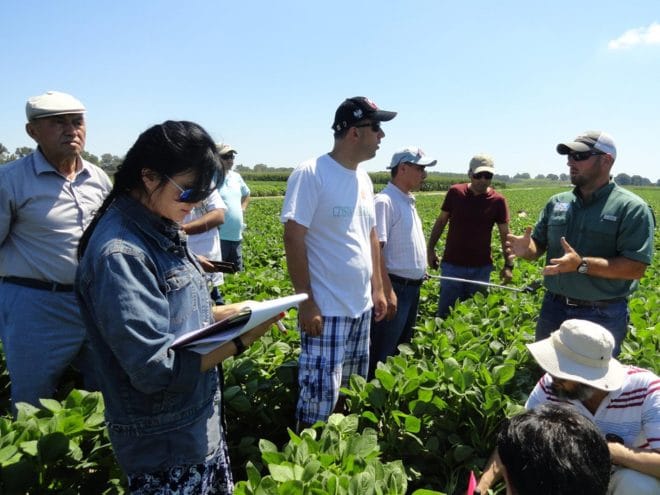STARKVILLE, Miss. — A climate-smart agriculture program at Mississippi State University helped train international agricultural leaders to achieve the global priority of maintaining safe, reliable food supplies.
This training initiative was part of the Cochran Fellowship Program, named for U.S. Sen. Thad Cochran. Since 1984, the program has trained more than 14,300 agricultural managers from 123 countries. Sponsored by the U.S. Department of Agriculture Foreign Agricultural Service, the program recruits U.S. universities to host mid-level officials from lower and middle-income countries. This year, eight agricultural professionals from Tajikistan were competitively selected to attend the Cochran Program for Tajikistan Climate Smart Agriculture at MSU.
Cochran Program training coordinator Prem Parajuli, an associate professor in the MSU Department of Agricultural and Biological Engineering, said the fellows spent two weeks learning about current methods, technologies and management practices. A major focus was the concept of climate change and how it impacts crop yield.
“They explored bioenergy crops, high-yielding seed varieties, real-time sensors, environmental monitoring of poultry housing, and water and nutrient management,” Parajuli said. “Fellows also learned more on government policies related to water and crop production. Using some Extension resources, they learned about water conservation and crop management issues.”
While a portion of their time was spent in lectures by faculty members and MSU Extension Service specialists, the fellows also gained hands-on experience in the field. At the Delta Research and Extension Center in Stoneville, they observed research on cultivation, tillage management and polypipe irrigation related to row crops. They also attended a field day in Pontotoc to learn about the use of herbicides on row crops.
Cochran fellow Khurshed Rakhimov said his initial impression was of the modernization and efficiency of U.S. agriculture.
“Upon entering the program, I realized there is much more about American agriculture that I had no clue about,” Rakhimov said. “I was so impressed by how much human and financial resources are put into research. In addition, the support agriculture receives from the government is amazing. In other countries I’ve visited, that is a major challenge. Americans are very fortunate.”
Each fellow represented a different field of agriculture. Parajuli said he believes this advantage will enable them to implement the knowledge gained into various sectors of their country’s agricultural industry.
“I hope that fellows expanded their knowledge and understanding about climate-smart agriculture, which they would apply in their country based on their individual action plans, whether it be through publishing information to educate the public, training other professionals in their field, or conducting meetings related to climate change and food security,” Parajuli said.
Information provided by Mississippi State University Extension Service.




